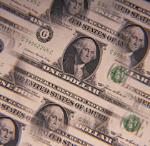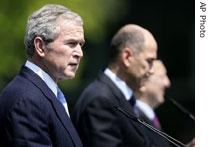VOA慢速英语-Economics Report - Talking Up the Dollar
搜索关注在线英语听力室公众号:tingroom,领取免费英语资料大礼包。
(单词翻译)
Paulson suggests that intervention1 in currency markets is possible, but Bush may not agree. Transcript2 of radio broadcast:
12 June 2008
This is the VOA Special English Economics Report. For several years now, the dollar has fallen lower and lower against other major currencies. Lately, though, the dollar has risen, especially against the Japanese yen3 and the euro. Some traders think the dollar will continue to rise, but that is not clear.
For several years now, the dollar has fallen lower and lower against other major currencies. Lately, though, the dollar has risen, especially against the Japanese yen3 and the euro. Some traders think the dollar will continue to rise, but that is not clear.
The dollar moved up this week after comments by American officials in support of a strong dollar policy.
On Monday, before he left for his last trip as president to Europe, George Bush said: "A strong dollar is in our nation's interests. It is in the interests of the global economy." Also Monday, Treasury4 Secretary Henry Paulson said on CNBC television that he would consider intervention to keep the dollar from sliding further.
The United States has not intervened in currency markets since two thousand. That year the administration of president Bill Clinton bought euros to support the European currency.
 |
| President Bush in Slovenia during what is expected to be the last trip of his presidency5 to Europe. He appears at a news conference with Slovenian Prime Minister Janez Jansa, center, and European Commission President Jose Manuel Barroso. |
But on Tuesday, President Bush said in Slovenia that the "relative value of economies will end up setting the proper valuation of the dollar."
A weaker dollar helps American exporters. But it means Americans have to pay more for imports and for travel to other countries.
Some experts say dollar weakness is the main reason why oil prices have risen so high. Oil is priced in dollars on the world market.
But Treasury Secretary Paulson dismissed any link. He noted6 that since two thousand two, the dollar has fallen about twenty-four percent. But the price of oil has gone up well over five hundred percent.
Adding to pressure on the dollar, European Central Bank President Jean-Claude Trichet suggested that the E.C.B will raise interest rates next month. European officials are increasingly concerned with inflation. But investors7 can already get higher rates of return on investments in euros than in dollars.
High prices for oil, food and other products have raised inflation concerns worldwide. Federal Reserve Chairman Ben Bernanke said the latest increases in energy prices have added to inflation risks.
His comments in recent days have suggested that the central bank could stop cutting rates as it has since September. Its rate for overnight loans between banks is currently at two percent. Some market watchers think the Fed could raise rates as early as this month.
Finance ministers from nations in the Group of Eight will discuss the dollar and other issues at their meeting this weekend in Osaka, Japan.
And that's the VOA Special English Economics Report, written by Mario Ritter. I'm Bob Doughty8.




